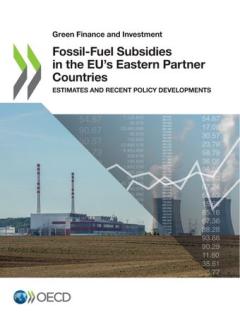
Subsidies to fossil-fuel production and consumption distort costs and prices and lead to inefficiencies in the economy. In addition, the combustion of fossil fuels results in high levels of CO2 and other greenhouse gas (GHG) emissions, as well as air pollution and related health problems. These can inflict a high cost on society.
This OECD report analyses fossil-fuel subsidies provided to producers and consumers of coal, oil and related petroleum products (particularly in the transport sector), natural gas, as well as electricity and heat generated on the basis of these fossil fuels in the six European Union's Eastern Partner (EaP) countries – Armenia, Azerbaijan, Belarus, Georgia, Republic of Moldova and Ukraine. The analysis is an update of the 2010-2015 subsidy estimates in the EaP region produced earlier by the OECD and covers the period 2016-2019.
The report aims to fill the data gap and provide a basis for discussion on fossil-fuel subsidy reform in the EaP countries. It focuses on measuring two major types of fossil-fuel subsidies: direct transfers of funds to producers and consumers and tax expenditure. It also discusses the taxation and energy pricing policies that have had a direct or indirect impact on the evolution of fossil-fuel subsidies in the region. Detailed estimates of all individual support measures for each of the six countries are provided in the report's annexes.
